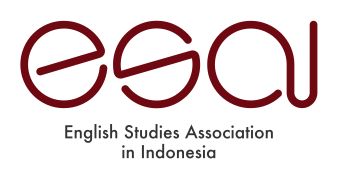UTILIZING FLASHCARDS TO IDENTIFY PHONOLOGICAL ERRORS AND ENHANCE LEARNING ENGAGEMENT AMONG STUDENTS WITH INTELLECTUAL DISABILITIES
Abstract
Education is a right for every individual. For students with mental disorders, teaching English poses a unique challenge that requires teachers to find effective teaching media for vocabulary instruction. This study aims to identify phonological errors of students with intelectual disabilities learning vocabulary and explore how to teach vocabulary to students with intelectual disabilities using flashcards the research employs a qualitative approach with descriptive analysis, involving observation and auditory analysis to identify four voice recordings from students with different intelectual disabilities. The results reveal that students who experienced ADHD and communication disorder showed good engagement during the learning process, but encountered pronunciation errors. Meanwhile, students with autism and slow learning experienced difficulties in both participating in learning activities and pronunciation. These difficulties are caused by intelectual disabilities affecting their socialization abilities and leading to learning delays. Based on these findings, it can be said that the use of flashcards is effective as a vocabulary-learning medium for students with mild mental disorders. However, for students with more severe mental disorders, a more authentic approach is required. This is important for educators to understand students’ conditions in determining the appropriate teaching media.
Keywords
Full Text:
PDFReferences
Agistiawati, E. (2020). Pengaruh Persepsi Siswa Atas Lingkungan Belajar dan Penguasaan Kosa KataTerhadap Kemampuan Berbicara Bahasa Inggris Siswa Sekolah Menengah Atas Swasta Balaraja. Journal of Education,Psychology and Counseling, 2(1), 513–523. https://ummaspul.e-journal.id/Edupsycouns/article/view/516
Arianti, R., & Rini, R. (2022). Learning of Children with Special Needs in Inclusive Schools. JOSR: Journal of Social Research Desember, 2022(1), 142–147. https://doi.org/10.55324/josr.v2i1.474
Baharun, H., & Awwaliyah, R. (2018). Pendidikan Inklusi bagi Anak Berkebutuhan Khusus dalam Perspektif Epistemologi Islam. MODELING: Jurnal Program Studi PGMI, 5(1), 57–71. https://doi.org/10.69896/modeling.v5i1.209
Bayu Prasetyo, K., & Rahmasari Jurusan Psikologi, D. (2016). Hubungan Antara Dukungan Sosial Keluarga dengan Motivasi Belajar pada Anak. Jurnal Penelitian Psikologi, 07(01), 1–9. https://jurnalfpk.uinsa.ac.id/index.php/JPP/article/view/92
Dessemontet, R. S., & Chambrier, A.-F. de. (2015). The role of phonological awareness and letter-sound knowledge in the reading development of children with intellectual disabilities. Research in Developmental Disabilities, 41–42, 1–12. https://doi.org/10.1016/j.ridd.2015.04.001
Dibra, B. (2014). Education as a fundamental right and human rights acquired through education. Mediterranean Journal of Social Sciences, 5(19), 155–159. https://doi.org/10.5901/mjss.2014.v5n19p155
Hajiyeva, B. (2024). Language Anxiety in ESL Learners: Causes, Effects, and Mitigation Strategies. EuroGlobal Journal of Linguistics and Language Education, 1(1), 119–133. https://doi.org/10.69760/pn9wgv05
Karningtyas, M. A., Wiendijarti, I., & Prabowo, A. (2009). Pola Komunikasi Interpersonal Anak Autis di Sekolah Autis Fajar Nugraha Yogyakarta. Jurnal Ilmu Komunikasi, 7(2), 120–129. https://doi.org/10.31315/jik.v7i2.16
Marzuki, Wulyani, A. N., Hidayati, Sata, M. R. I. M., & Rusdin, D. (2024). Overcoming challenges: Indonesian EFL teachers’ strategies for using moodle in high schools. Social Sciences and Humanities Open, 10. https://doi.org/10.1016/j.ssaho.2024.101175
Oktapyanto, R. R. Y. (2016). Penerapan Model Pembelajaran Simulasi untuk Meningkatkan Keterampilan Sosial Anak Sekolah Dasar. Jurnal Pendidikan Sekolah Dasar, 2(1), 96–108. https://doi.org/10.30870/jpsd.v2i1.671
Prameswari, I. D., & Akhiriyah, S. (2023). The Correlation Between Reading Fluency and Students’ Reading Comprehension in Junior High School. Journal of English Teaching, Literature, and Applied Linguistics, 7(2), 39. https://doi.org/10.30587/jetlal.v7i2.5944
Pratiwi, M. R., Mardiana, L., & Yusriana, A. (2019). Komunikasi Non Verbal Anak Autis pada Masa Adaptasi Pra Sekolah. Komunida: Media Komunikasi Dan Dakwah, 09, 37–52. http://ejurnal.stainparepare.ac.id/index.php/komunida
Schuit, M. Van der, Segers, E., Balkom, H. van, & Verhoeven, L. (2011). How cognitive factors affect language development in children with intellectual disabilities. Research in Developmental Disabilities, 32(5), 1884–1894. https://doi.org/10.1016/j.ridd.2011.03.015
Shree, A., & Shukla, P. C. (2016). Intellectual Disability: Definition, classification, causes and characteristics. Learning Community-An International Journal of Educational and Social Development, 7(1), 9. https://doi.org/10.5958/2231-458x.2016.00002.6
Susanto, & Nanda, D. S. (2023). Analyzing the Student’s Phonological Awareness and Its Relation to The Reading Skill In EFL Classroom. Jurnal Ilmiah Peuradeun, 11(2), 425–440. https://doi.org/10.26811/peuradeun.v11i2.793
Zendeli, E. (2017). The right to education as a fundamental human right. Contemporary Educational Researches Journal, 7(4), 158–166. https://doi.org/10.18844/cerj.v7i4.2718
Zuhro, C., & Hermawati, D. A. (2017). Pelatihan Bahasa Inggris Komunikatif Sebagai Upaya Peningkatan Kualitas SDM Dalam Menghadapi Tantangan MEA Bagi Santriwati Pondok Pesantren Al-Husna Jember. Jurnal Pengabdian Masyarakat, 1. https://doi.org/10.25047/j-dinamika.v2i1.444
DOI: http://dx.doi.org/10.30813/jelc.v15i2.8139
Refbacks
- There are currently no refbacks.



2.jpg)



